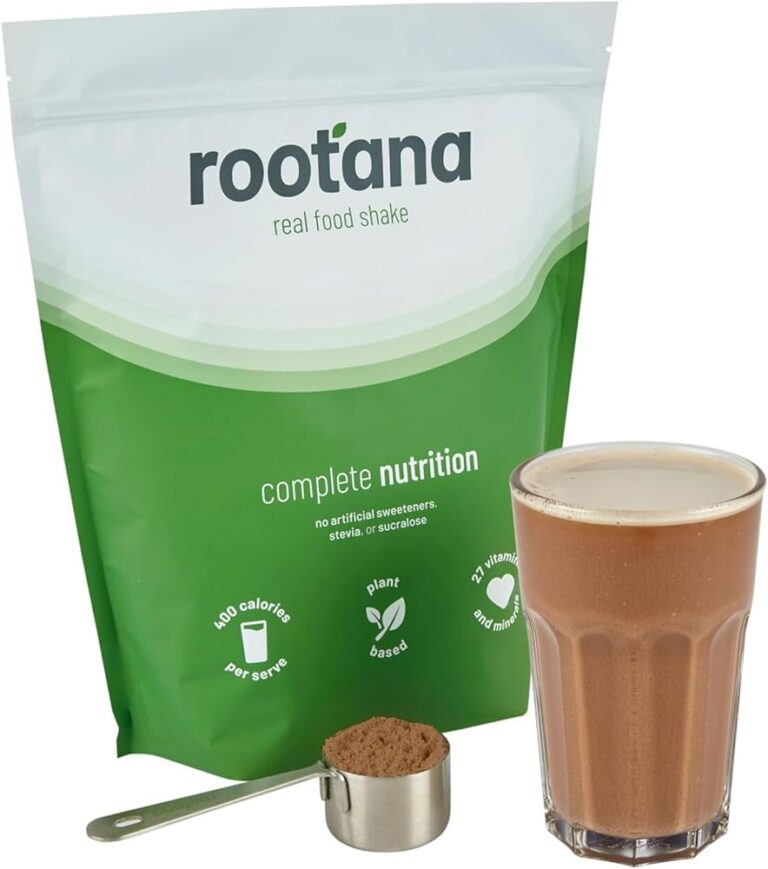Meal replacement shakes have become increasingly popular among health-conscious consumers looking for a convenient, nutrient-dense alternative to traditional meals. Two major players in this space are Kachava and Rootana, both of which emphasize natural, plant-based ingredients. In this in-depth comparison, we’ll analyze these two products based on ingredients, macronutrient composition, taste, and value for money to determine which one comes out on top.
Kachava: Superfood-Packed Meal Replacement Shake
Overview
Kachava is a well-known meal replacement shake in the U.S., marketed as a superfood powerhouse with a unique blend of natural and exotic ingredients. It boasts an impressive 85 superfoods, plant-based proteins, and essential nutrients, making it a strong contender in the world of complete nutrition.
Ingredients
Kachava’s formula includes a rich blend of plant-based proteins, fiber, vitamins, minerals, probiotics, and superfoods, such as:
- Protein sources: Yellow pea protein, organic brown rice protein, sacha inchi, quinoa
- Superfoods: Acai berry, maca root, camu camu, maqui berry, tart cherry, coconut flower nectar
- Super greens: Spinach, kale, broccoli, chlorella, parsley, asparagus, beetroot
- Gut health blend: Probiotics and prebiotic fiber
- Sweeteners: European version uses Stevia, while the U.S. version contains monk fruit extract and coconut sugar
Macronutrient Breakdown
- Calories per serving: 250 kcal
- Protein: 25g
- Carbohydrates: 24g
- Fiber: 6g
- Fats: 7g
Taste and Satiety
Kachava comes in five flavors—Vanilla, Chocolate, Chai, Matcha, and Coconut Açaí. The shake has a naturally sweet taste due to its inclusion of Stevia or monk fruit extract. While this provides a palatable experience, some users report an aftertaste commonly associated with sweeteners. Due to its relatively low fiber and calorie content, Kachava may not keep you full for as long as a complete meal would.
Rootana: Clean and Balanced Nutrition
Overview
Rootana takes a simpler and more natural approach to meal replacement shakes, focusing on providing balanced nutrition without artificial or natural sweeteners. Unlike Kachava, it avoids Stevia, monk fruit extract, and artificial additives, relying instead on natural coconut sugar for a subtle sweetness.
Ingredients
Rootana prioritizes whole food-based nutrition with fewer ingredients, including:
- Protein sources: Pea protein isolate
- Carbohydrate sources: Oat flour
- Healthy fats: Flaxseed, sunflower seed oil
- Essential nutrients: 27 vitamins and minerals
- Sweetener: Coconut sugar (no artificial or natural sweeteners)
Macronutrient Breakdown
- Calories per serving: 400 kcal
- Protein: 20–21g
- Carbohydrates: 43–44g
- Fiber: 7–9g
- Fats: 14–16g
Taste and Satiety
Rootana is available in Original and Chocolate flavors (with a Vanilla option in some markets). Since it lacks artificial or natural sweeteners, its taste is more neutral, catering to those who prefer a less overpowering flavor profile. The higher fiber and calorie content make it more satiating, helping to sustain energy levels for longer periods.
Kachava vs. Rootana: Head-to-Head Comparison
| Feature | Kachava | Rootana |
|---|---|---|
| Calories per Serving | 250 kcal | 400 kcal |
| Protein | 25g | 20–21g |
| Carbohydrates | 24g | 43–44g |
| Fiber | 6g | 7–9g |
| Fats | 7g | 14–16g |
| Sweeteners | Stevia (EU) / Monk Fruit (US) | Coconut Sugar |
| Number of Flavors | 5 | 2–3 |
| Superfoods & Adaptogens | Yes | No |
| Probiotics & Prebiotics | Yes | No |
Final Verdict: Which One is Better?
Best for Nutrient Density & Superfoods: Kachava
Kachava is the winner when it comes to superfood diversity and nutrient density. With its extensive blend of fruits, greens, adaptogens, and probiotics, it offers a comprehensive mix of health-boosting ingredients. However, its lower calorie and carbohydrate content may make it less effective as a full meal replacement.
Best for Satiety & Balanced Macros: Rootana
If you’re looking for a meal replacement shake that truly keeps you full and provides a well-balanced macronutrient profile, Rootana comes out on top. With higher calories, fiber, and complex carbohydrates, it delivers longer-lasting energy and sustained satiety. Additionally, it avoids artificial and natural sweeteners, making it ideal for those sensitive to Stevia or monk fruit extract.
Final Recommendation
- Choose Kachava if you want a nutrient-dense, superfood-packed shake with probiotics and prebiotics.
- Choose Rootana if you prefer a simpler, more natural meal replacement that provides long-lasting energy without artificial or natural sweeteners.
Ultimately, the best choice depends on your personal nutritional goals and taste preferences. If you’re looking for a true meal replacement, Rootana offers a more satiating and balanced option, whereas Kachava shines in superfood variety and micronutrient diversity.
Do you have experience with Kachava or Rootana? Share your thoughts in the comments!

